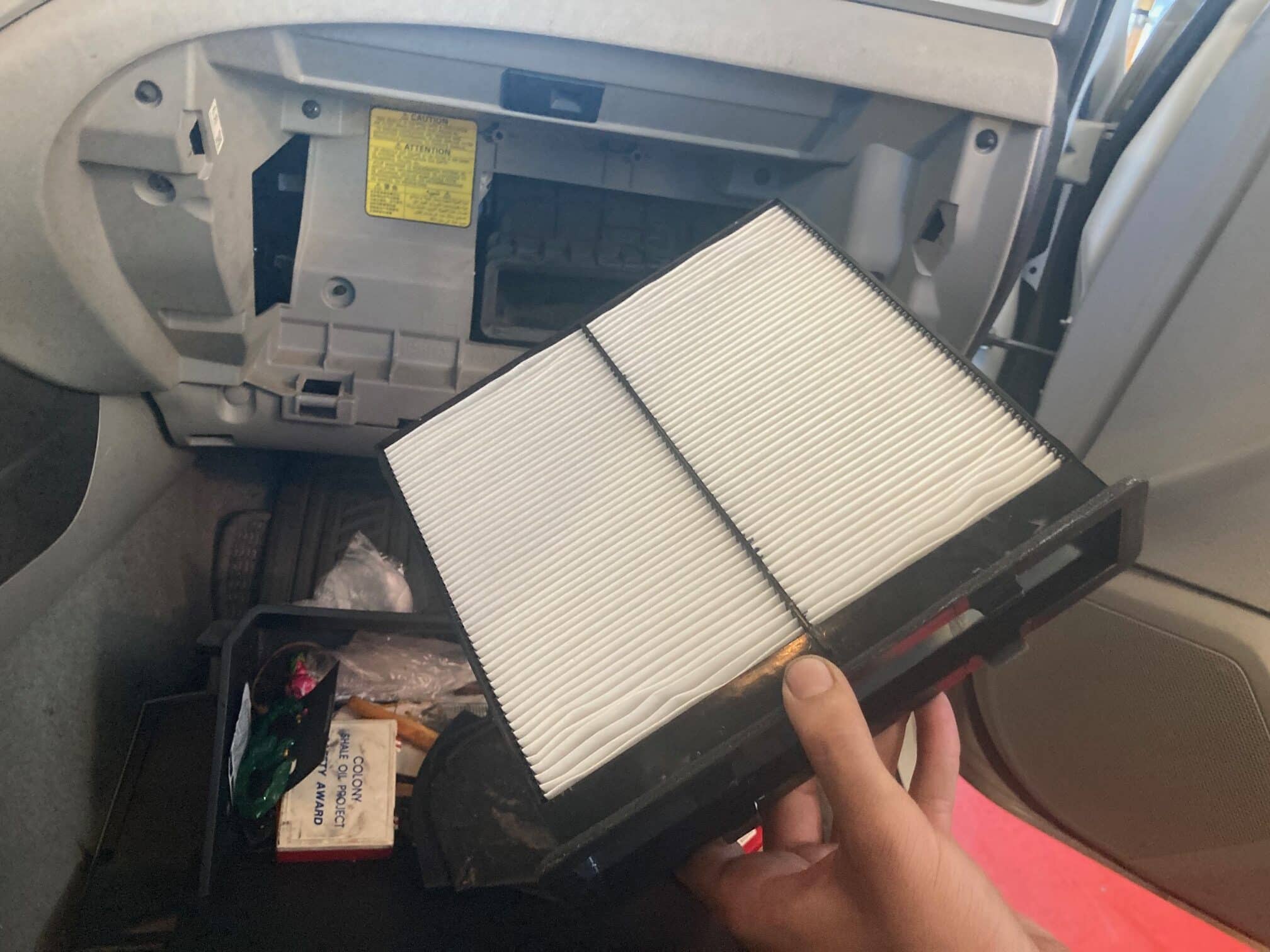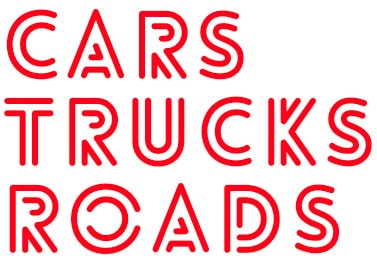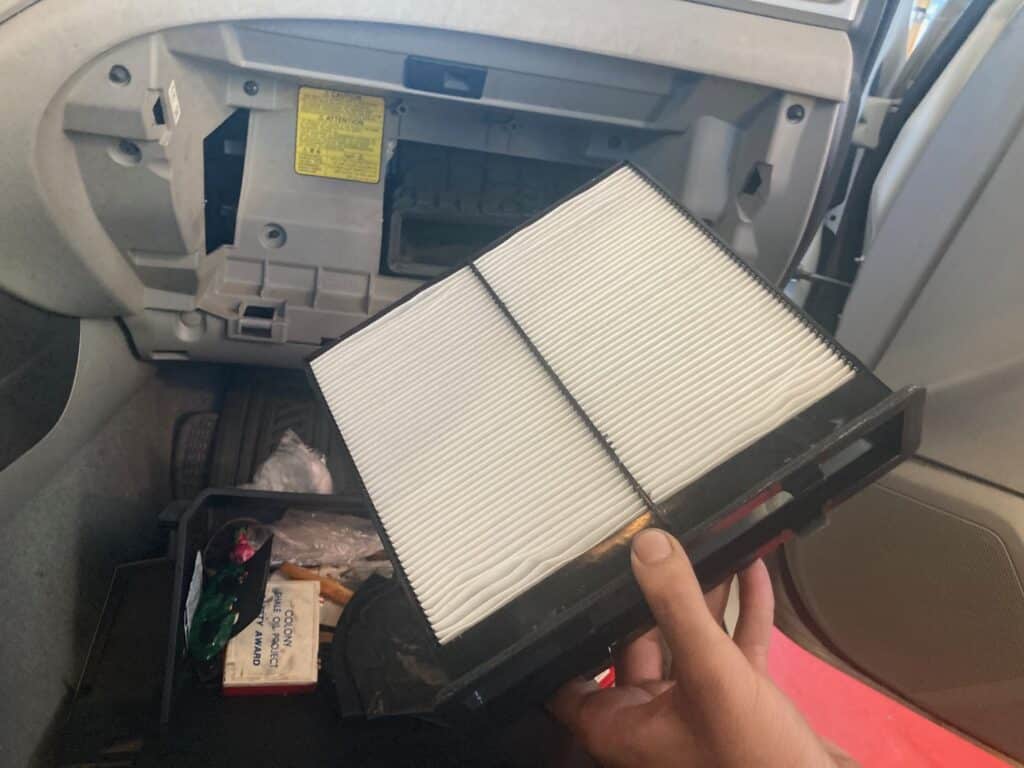
When it comes to vehicle maintenance, understanding the difference between a cabin filter and an air filter is crucial. These two filters serve distinct roles in your car, ensuring both the efficiency of your engine and the quality of the air you breathe. Let’s break down their unique purposes and importance.
Cabin Filter vs Air Filter: Main Takeaways
The Cabin Filter’s Role
The cabin filter, often overlooked, is responsible for cleaning the air that enters the vehicle’s cabin. As you drive, it traps pollen, dust, and other airborne contaminants. This ensures passengers breathe cleaner, fresher air.
The Air Filter’s Function
The air filter, on the other hand, protects your engine. It cleans the air entering the engine, removing debris and dirt. A clean air filter ensures optimal combustion and performance.
Key Differences Between Cabin and Air Filters in Vehicles
| Cabin Filter | Air Filter | |
| Primary Purpose | Filters air entering the vehicle’s cabin. | Filters air entering the engine for combustion. |
| Location | Typically under the dashboard, behind the glove compartment, or near the windshield. | Usually in the engine compartment, housed in a black plastic box. |
| Signs of Clogging | Reduced airflow in the cabin, musty or unpleasant odor from vents. | Decreased fuel efficiency, diminished engine performance, potential engine misfires. |
| Materials Filtered | Pollen, dust, pollutants, and other airborne contaminants. | Dirt, debris, and other contaminants that could harm the engine. |
| Air Filter | Often replaced annually or every 15,000 miles. Check vehicle’s manual for specific intervals. | Typically replaced every 30,000 miles, but can vary based on conditions and vehicle model. |
Cabin Filter vs Air Filter: Access and Location in Vehicles
While both the cabin filter and air filter are essential components of a vehicle, their location and accessibility can differ considerably. For many vehicles, accessing the cabin filter can be a bit more challenging than the air filter. Let’s dive into how to locate them and why the cabin filter might be trickier to access.
Location of the Air Filter
The air filter, designed to protect your engine from debris, is usually housed in a black plastic box located in the engine compartment. Its placement is typically towards the top of the engine, making it relatively easy to find and access for most vehicles.
Locating the Cabin Filter
The cabin filter, ensuring the air quality within the vehicle’s interior, has a more concealed placement. Common locations include:
- Under the dashboard: This may require removal of panels or covers.
- Behind the glove compartment: In some cases, you might need to unfasten the glove box to access the filter.
- Under the hood near the windshield: This is less common, but some models house the cabin filter in this area.
Why Cabin Filters Can Be Tricky
Accessing the cabin filter is often more involved because it’s placed within the confines of the vehicle’s interior. This design choice prioritizes:
- Keeping the filter away from extreme engine temperatures.
- Centralizing it to effectively clean the air entering the vehicle’s cabin. However, this often means navigating more panels, screws, or clips to reach it.
Tips for Accessing the Cabin Filter
- Consult the Owner’s Manual: This will usually have clear instructions and diagrams showing the cabin filter’s location.
- Be Gentle: When removing panels or the glove box, apply gentle pressure to avoid breaking any plastic clips or mounts.
- Consider Marking Screws/Clips: If there are multiple screws or clips, marking their original positions can simplify the reassembly process.
While the air filter is typically straightforward to locate, the cabin filter may require a bit more effort and patience due to its concealed placement. Regularly checking and replacing both filters is essential for vehicle performance and interior air quality. Always refer to your vehicle’s manual and consider seeking professional assistance if unsure about the process.
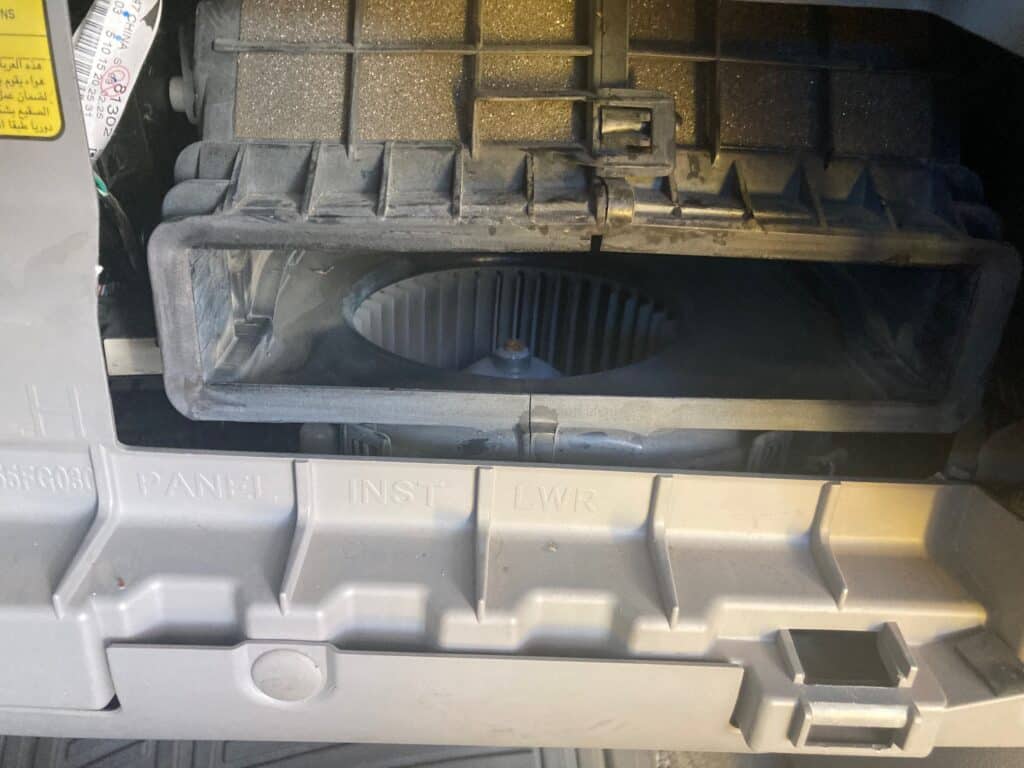
Why Maintenance Matters and Replacement Frequencies
Both filters require regular check-ups. A clogged cabin filter reduces air flow and efficiency, making your vehicle’s air conditioning work harder. Similarly, a dirty air filter can diminish engine performance and increase fuel consumption.
Generally, cabin filters should be replaced annually or every 15,000 miles. Air filters might need attention every 30,000 miles, but this can vary depending on driving conditions and the specific vehicle model.
Signs of a Clogged Filter
Cabin Filter Indicators
The cabin filter primarily ensures the cleanliness of the air inside your vehicle’s cabin. When it’s clogged, you may experience:
- Reduced airflow from the air vents, making the air conditioning or heating less effective.
- A noticeable musty or unpleasant odor emanating from the vents, indicating trapped contaminants like mold or bacteria.
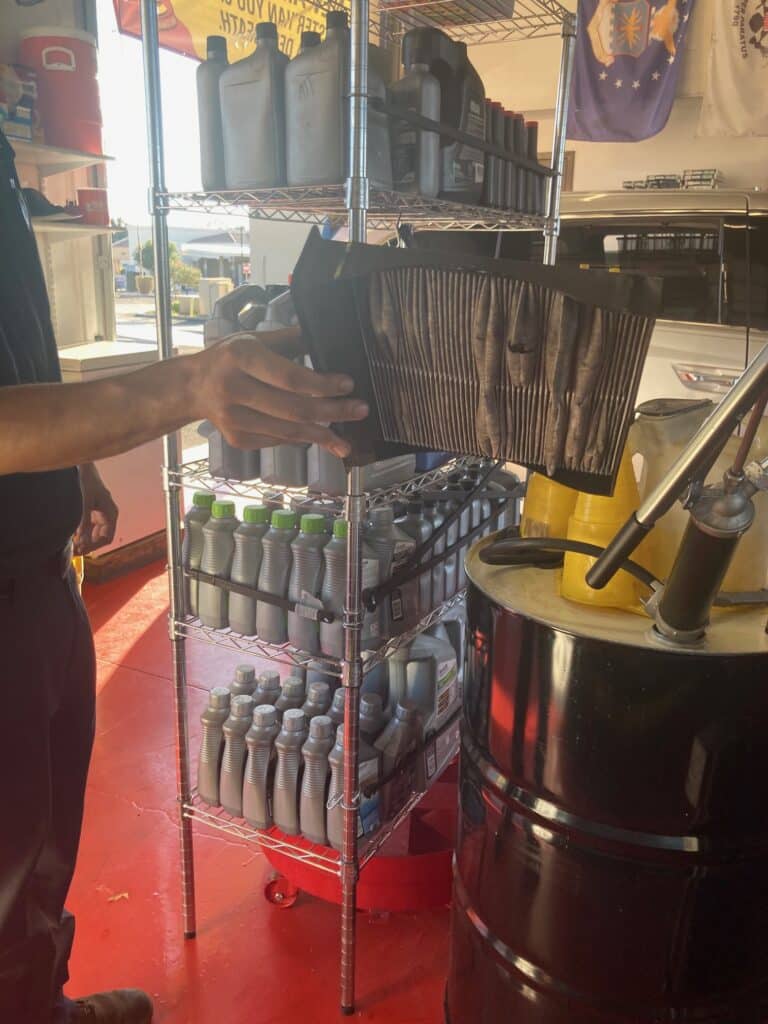
Air Filter Indicators
The air filter’s role is to safeguard the engine from airborne debris. A compromised air filter can lead to:
- Decreased fuel efficiency, as a clogged filter restricts the air needed for optimal combustion.
- A noticeable drop in engine performance or power, due to the engine struggling to intake sufficient clean air.
- Sometimes, a misfiring engine, as dirt and particles entering the engine can cause this issue.
Cabin filters and air filters play vital roles in your vehicle’s operation and your comfort. Regularly checking and replacing them ensures a smoother ride, optimal performance, and cleaner air. Stay on top of these tasks for a vehicle that runs efficiently and keeps the air fresh.
Cabin Filter Vs Air Filter: Things to Know About Changing Them and Costs
When it comes to vehicle maintenance, both the cabin filter and the air filter play crucial roles. Over time, these filters can become clogged with debris and need to be replaced to ensure optimal vehicle performance and interior air quality. The big question for many vehicle owners is whether to change these filters themselves (DIY) or hire professionals. Let’s explore both options.
Do It Yourself
- Advantages:
- Cost-effective as you’re only paying for the replacement filter.
- Offers hands-on experience and familiarity with your vehicle.
- Can be done at your own pace and convenience.
- Challenges:
- Some vehicle models may have hard-to-access filter locations.
- Requires basic tools and potentially dealing with clips, screws, or covers.
- Lack of experience may lead to improper installation or damage.
Professional Service
- Advantages:
- Ensures the job is done correctly with appropriate tools.
- Saves time and avoids potential mistakes.
- Might come with additional checks or services.
- Challenges:
- Costs more than DIY due to labor charges.
- Requires scheduling an appointment and potentially waiting.
Price Range for Changing Filters
- DIY:
- Cabin Filter: $10-$50 (depending on vehicle make and filter quality).
- Air Filter: $10-$60 (depending on vehicle make and filter quality).
- Professional Service:
- Cabin Filter Replacement: $50-$150 (includes labor and parts).
- Air Filter Replacement: $40-$120 (includes labor and parts).
Conclusion
Whether to go DIY or professional largely depends on your comfort level with vehicle maintenance tasks, the tools you have at your disposal, and the specific model of your vehicle. If you’re confident and have previously worked on cars, changing the filters yourself can save money. However, if you’re unsure or want the peace of mind that comes with professional service, it might be worth the extra cost. Always research your specific vehicle model and consult the owner’s manual before making a decision.
Cabin Filter vs Air Filter: FAQs
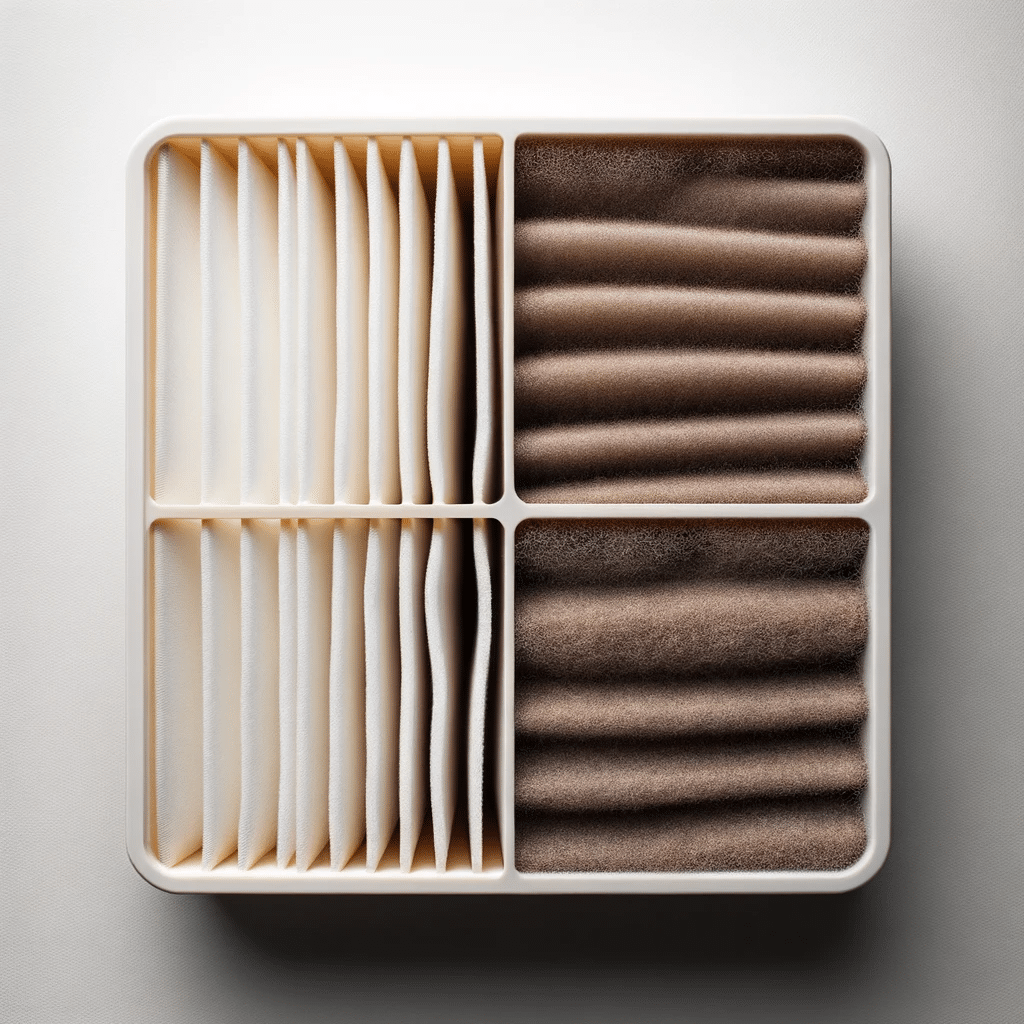
What is the primary function of the cabin filter?
The cabin filter cleans the air that enters the vehicle’s cabin, trapping pollutants like pollen, dust, and other airborne contaminants.
How does the air filter protect my vehicle?
The air filter prevents dirt, debris, and other harmful particles from entering the engine, ensuring optimal combustion and protecting the engine from potential damage.
I live in a city with high pollution; how often should I change my cabin filter?
In areas with high pollution, it’s advisable to check and potentially replace the cabin filter more frequently than the usual annual or 15,000-mile recommendation.
My area was recently affected by a wildfire. Should I change both my filters?
Yes, wildfires can spread ash and fine particulate matter. It’s a good idea to check both filters and consider replacing them to ensure clean air in the cabin and protect your engine.
Can I replace these filters myself?
Depending on the vehicle model, many owners can replace both filters themselves. However, if you’re unsure or lack the necessary tools, it might be best to consult a professional.
What is a HEPA filter in a vehicle?
HEPA (High Efficiency Particulate Air) filters in vehicles are designed to capture a minimum of 99.97% of particles 0.3 microns in diameter, such as pollen, dust, and smoke. Vehicles with HEPA filters offer a higher standard of air purification in the cabin.
If I don’t drive my car often, do the filters still need regular replacement?
Even if you don’t drive frequently, filters can still become clogged over time with ambient particles. It’s good practice to check them annually or as recommended in your vehicle’s manual.
How can I tell if my air filter is due for a change?
Signs include decreased fuel efficiency, reduced engine performance, or even engine misfires. It’s wise to visually inspect the filter for any visible dirt or clogging.
Is it more expensive to have a professional replace the filters compared to DIY?
Typically, yes. Doing it yourself means you’ll only pay for the parts. A professional service will include labor costs, but it offers the peace of mind that the job is done correctly.
Why might I notice a musty smell even after changing the cabin filter?
If there’s still a musty smell after replacement, there might be mold or mildew in the air vents or system. It might require a more thorough cleaning or professional inspection.
Can a clogged air filter affect my vehicle’s gas mileage?
Yes, a clogged air filter can restrict airflow to the engine, leading to suboptimal combustion and, consequently, reduced fuel efficiency.
What happens if I never change my cabin filter?
Over time, a neglected cabin filter can become heavily clogged, leading to reduced airflow from the vents, increased strain on the HVAC system, and a potential decrease in air quality within the vehicle, exposing occupants to allergens and pollutants.
Do all vehicles come with a cabin filter?
While most modern vehicles are equipped with a cabin filter, some older models might not have one. Always check your owner’s manual or consult with your vehicle’s manufacturer.
How do I find out the specific type and size of filters my car needs?
The best place to find this information is in your vehicle’s owner’s manual. Alternatively, auto parts stores and online databases can provide this information based on your vehicle’s make and model.
Are there “universal” filters that fit all cars?
No, filters are often specific to vehicle makes and models. While some filters might fit a range of models from a specific manufacturer, there’s no true “one-size-fits-all” filter.
Why do workers often suggest changing the air filter during an oil change but not the cabin filter?
The engine air filter plays a direct role in the vehicle’s performance and efficiency, impacting the combustion process. Since oil changes directly relate to engine health and performance, workers tend to pair these two together. The cabin filter, on the other hand, affects the interior air quality and doesn’t directly influence engine performance, so it might be overlooked during a standard oil change service.
Is there a direct relationship between oil changes and air filter replacements?
While both the oil change and air filter replacement relate to the engine’s health, they serve different functions. Regular oil changes ensure clean lubrication and optimal engine operation, while air filter replacements guarantee that clean air enters the engine for combustion. Over time, a dirty air filter can decrease engine efficiency, which can, in turn, affect overall performance.
Does a dirty air filter affect engine oil quality?
Indirectly, yes. A clogged air filter can result in incomplete combustion, causing carbon deposits to form in the engine. Over time, these deposits can contaminate the engine oil, affecting its lubrication properties.
Should I ask about the cabin filter when I get an oil change?
Yes, it’s a good practice. While the cabin filter might not always be included in the standard checks during an oil change, it’s beneficial for you to inquire about its condition, especially if you haven’t had it checked or replaced in a while.
If I’m allergic to pollen, will a HEPA cabin filter help?
Absolutely. HEPA filters are specifically designed to trap tiny particles, including pollen. If you have allergies, upgrading to a HEPA filter can improve the air quality inside your vehicle.
Does engine air filter quality matter, or can I go with any brand?
Quality does matter. A high-quality air filter will provide better protection for your engine and might last longer than a lesser-quality filter. Research brands and reviews, and consider investing in a reputable filter.
Can some cabin filters and air filters be cleaned and reused?
Yes, there are reusable cabin and air filters available on the market. These are typically made of a special fabric or other materials that can be cleaned, re-oiled (in the case of certain engine air filters), and then reinserted. Brands such as K&N are known for making reusable engine air filters.
My car has been in storage for a long time. Should I change the filters before driving again?
It’s a good idea to check both the cabin and air filters if a vehicle has been in storage. They may have collected dust or become a home for pests.
Is it necessary to replace both filters at the same time?
While it’s not necessary, it can be convenient for maintenance tracking. However, each filter may have different lifespans based on usage and environmental factors.
Can a bad cabin filter affect my AC’s performance?
Yes, a clogged cabin filter can reduce airflow, causing the AC system to work harder and potentially reducing its cooling efficiency.
You might also like: Understanding the Difference: Fuel Filter vs Oil Filter
